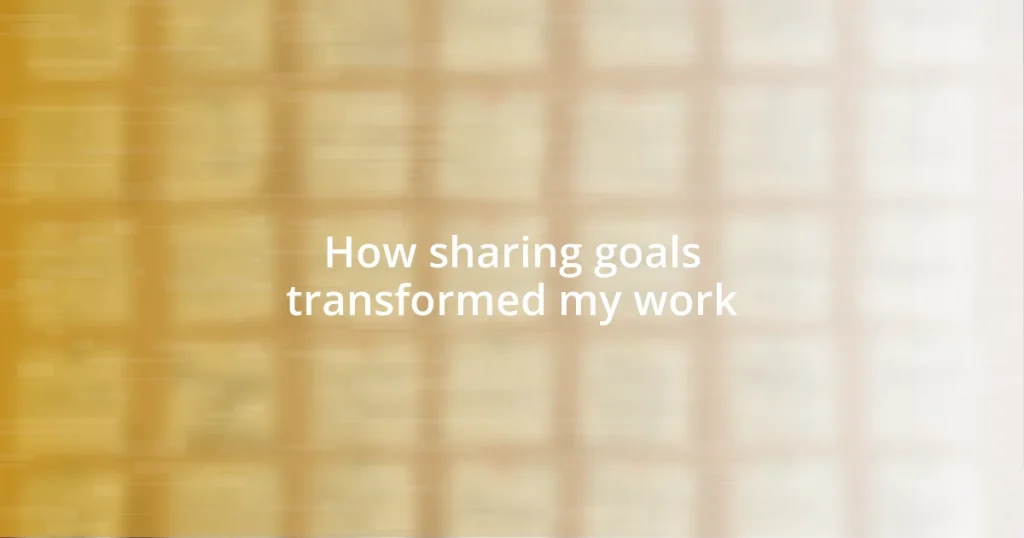Key takeaways:
- Setting clear goals ignites motivation, provides a framework for measuring progress, and fosters accountability through shared ambitions.
- Effective goal-setting involves both personal and team objectives, enhancing communication and creating unity within the team.
- Regular reflection and adjustment of goals strengthen adaptability, turning challenges into opportunities for growth and success.
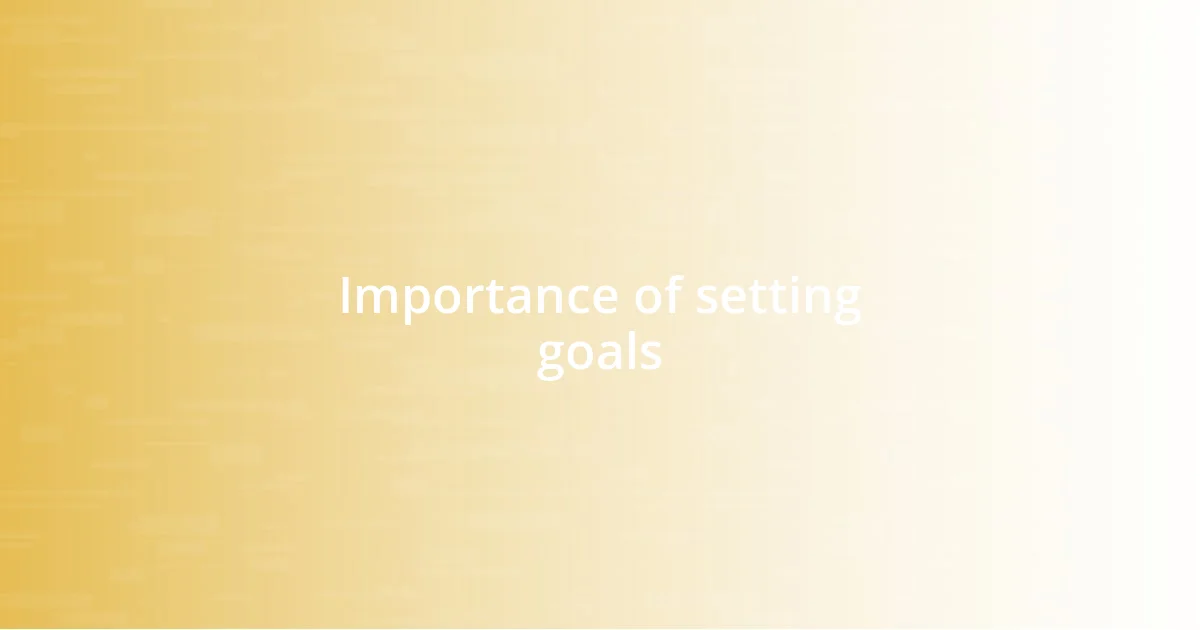
Importance of setting goals
Setting goals is essential because they act as a compass that guides our decisions and actions. I remember when I was feeling lost in my career; it was only when I wrote down specific objectives that I began to feel a sense of direction. It’s incredible how clearly defining what you want can ignite a fire of motivation within you.
Additionally, goals provide a framework for measuring progress. Have you ever reached a milestone and felt that rush of pride? Personally, celebrating each small victory along my goal-setting journey has kept me motivated and focused. It’s a reminder that even on tough days, I’m moving forward.
Lastly, setting goals fosters accountability, both to ourselves and others. When I shared my ambitions with friends and colleagues, it added an extra layer of commitment. Isn’t it powerful to know you’re not alone in your pursuit? By openly discussing my goals, I created a support system that has proven invaluable on days when my motivation wanes.
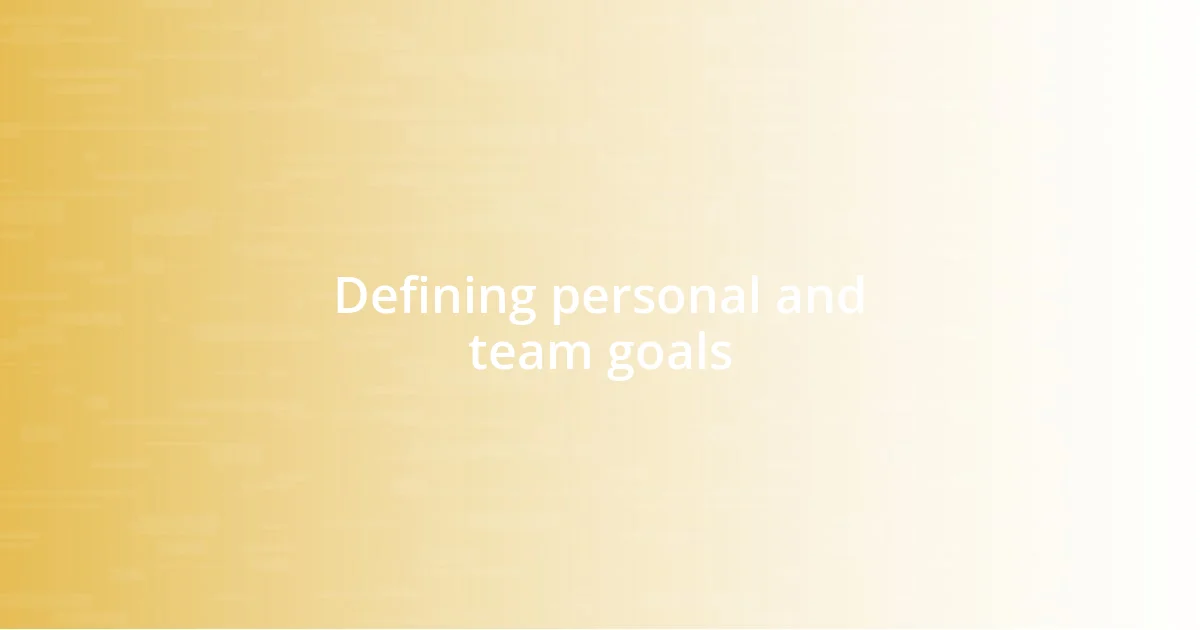
Defining personal and team goals
Defining personal and team goals requires a blend of introspection and collaboration. Personally, I’ve found that when I take the time to articulate my individual objectives, it clarifies not just what I want to achieve but also what I can contribute to the team’s success. I recall a time when I set a personal goal to improve my project management skills; sharing this with my team led us to establish collective milestones that aligned with our overall mission, creating a harmonious synergy.
On a team level, defining goals becomes a powerful way to unify our efforts. I remember a project where we implemented weekly check-ins to discuss our shared objectives. This approach transformed our communication. It was fascinating to see how individual aspirations intertwined with team goals, allowing us to celebrate each other’s successes and learn from setbacks together. It felt as if we were all rowing in the same direction, making us far more effective.
To bring this into sharper focus, I’ve put together a comparison table that distinguishes personal from team goals. It highlights how each type of goal serves different yet complementary purposes.
| Aspect | Personal Goals | Team Goals |
|---|---|---|
| Focus | Individual aspirations | Collective success |
| Motivation | Self-driven | Group accountability |
| Measurement | Personal milestones | Team achievements |
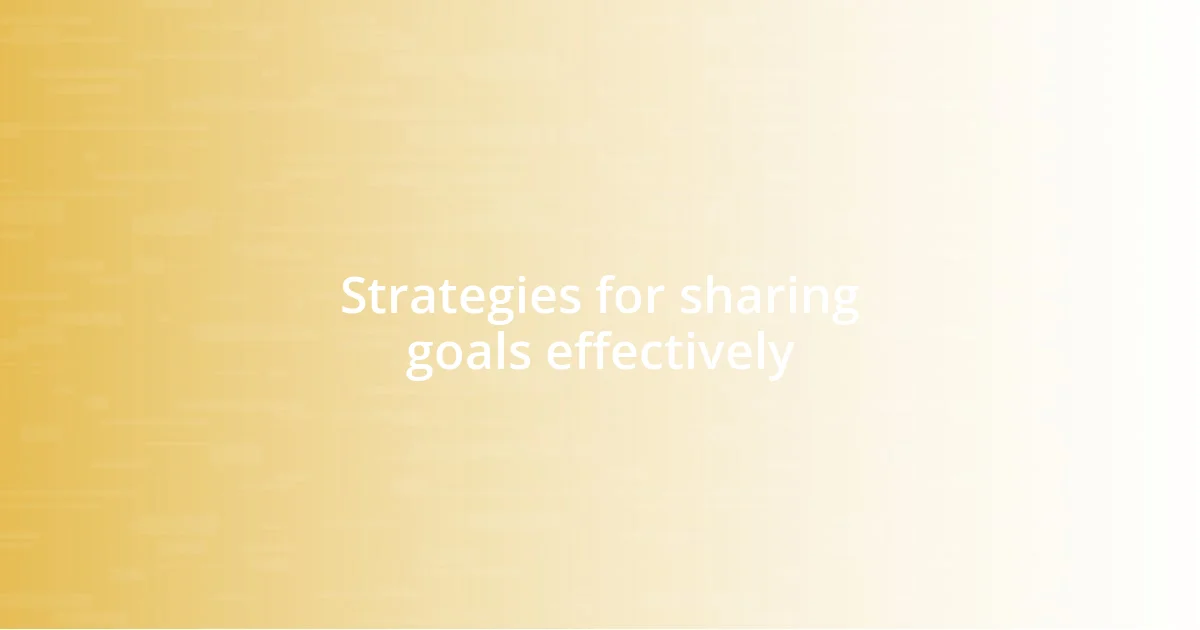
Strategies for sharing goals effectively
Sharing goals effectively takes a thoughtful approach, and I’ve learned that clarity is vital. When I communicate my goals, I make sure to use simple language that everyone understands. I once led a project where I laid out my objectives in a shared document, complete with visuals. The feedback I received was invaluable; it not only clarified the targets but also made team members feel like they could contribute their insights without hesitation.
Here are some strategies that have worked wonders for me:
- Use visuals like charts or graphs to illustrate your goals.
- Schedule regular check-ins to discuss progress and address concerns.
- Encourage open dialogue about personal and team objectives.
- Create a shared online platform where everyone can access and update goal-related documents.
- Celebrate milestones together to foster a sense of unity and shared accomplishment.
I’ve found that acknowledging small wins really boosts morale. After a significant project, I organized a casual team lunch to reflect on what we collectively achieved. It was not just motivating; it bonded us in ways I hadn’t anticipated.
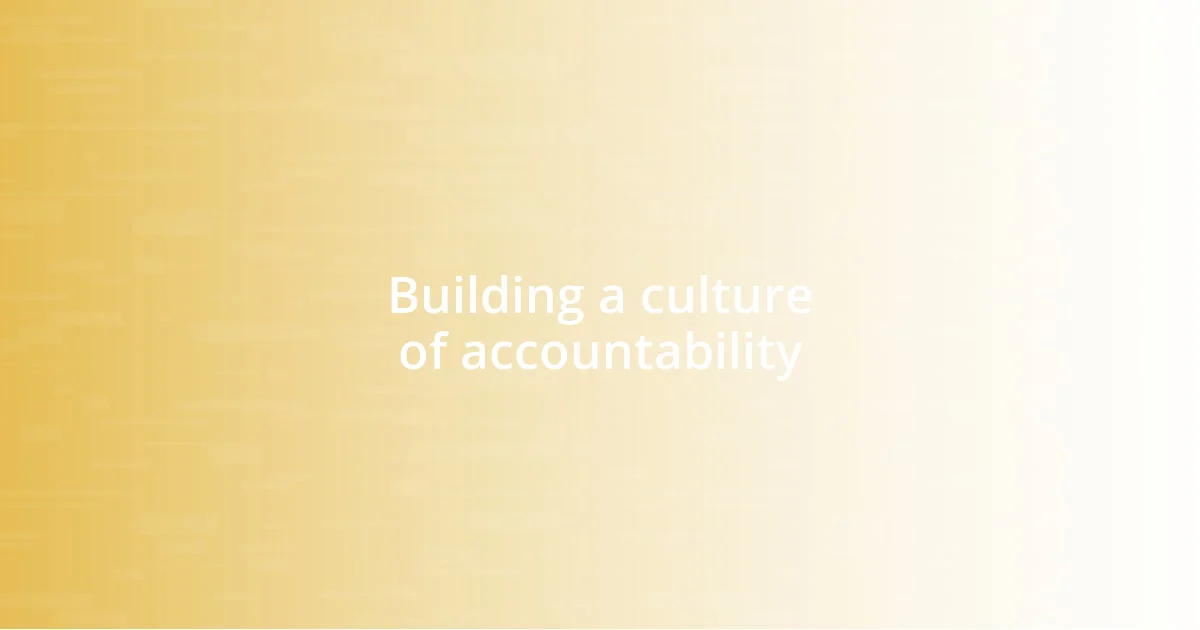
Building a culture of accountability
Building a culture of accountability requires more than just assigning responsibilities; it’s about fostering an environment where everyone feels ownership of their contributions. I vividly remember the first time our team embraced this principle: we held a brainstorming session where everyone could voice their thoughts on our objectives. It was heartening to see how my colleagues opened up about their roles, realizing that accountability doesn’t mean blaming each other but rather uplifting one another toward shared success.
When we framed accountability as a team virtue, something remarkable happened. Instead of anxiety over deadlines, we found camaraderie in collectively navigating challenges. I’ll never forget when a team member missed a project deadline. Instead of pointing fingers, we gathered to discuss roadblocks together, and I felt a surge of support in that moment. We recognized that by holding each other accountable, we became a tighter-knit team, learning from our missteps rather than dwelling on them.
The real beauty of accountability unfolds when team members begin to rely on one another’s commitments. Have you ever noticed how powerful it feels when you know someone is counting on you? I discovered this firsthand during a critical presentation preparation where we all pledged to support one another. Watching us lean on each other boosted not only our confidence but also our performance. It became clear to me that accountability is not just a method; it’s an emotional bond that strengthens our collective resolve.
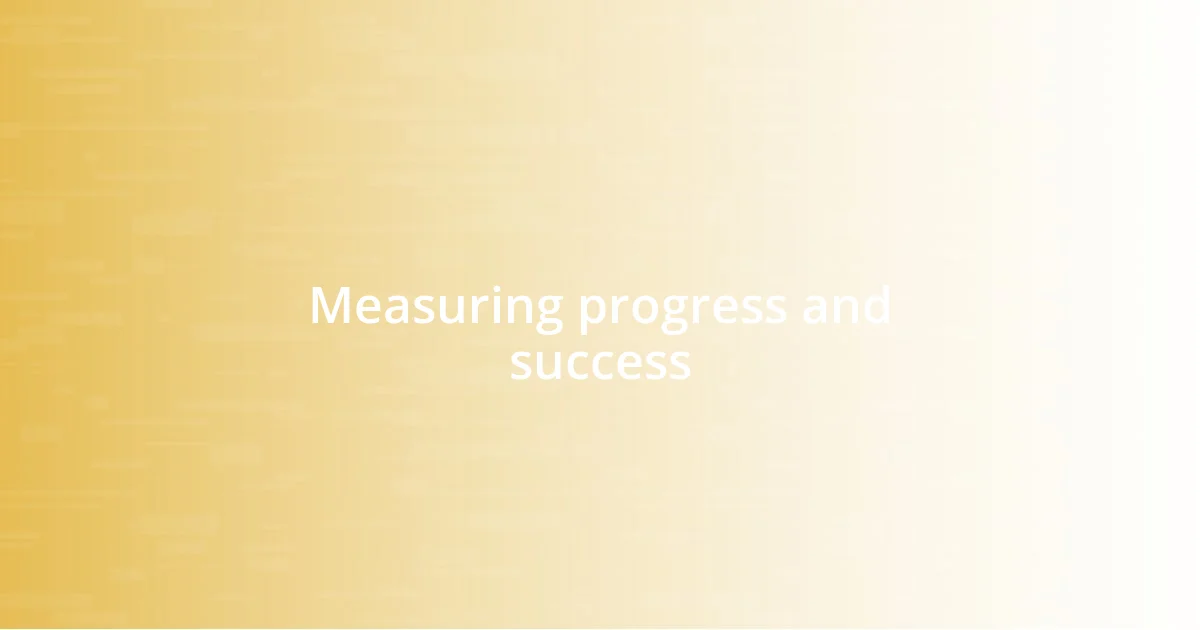
Measuring progress and success
Measuring progress and success can sometimes feel like a daunting task, but I’ve learned to break it down into manageable steps. For example, I started using a simple progress tracker that everyone could update regularly. Watching the status bars climb was incredibly satisfying and provided a visual representation of our collective effort. It fostered a sense of accomplishment that we could celebrate together.
Reflecting on past projects, I remember how impactful our milestone celebrations were. After reaching a significant goal, I once organized a brief meeting where we shared our learnings. Each team member presented their highlights, and it felt rewarding to hear how our combined work led to tangible results. Have you ever felt that rush of pride when you realize that everyone’s contributions matter? Those moments not only marked our success but also created lasting memories.
I also believe in the power of feedback loops. Early in my journey with shared goals, I instituted monthly feedback sessions, and they became invaluable. These meetings weren’t just about measuring success against targets; they were an opportunity to discuss challenges and refine our approach. I still remember the excitement when we adjusted our strategy based on the insights shared, leading us to success beyond our initial expectations. Isn’t it amazing how adapting and learning can reshape our path?
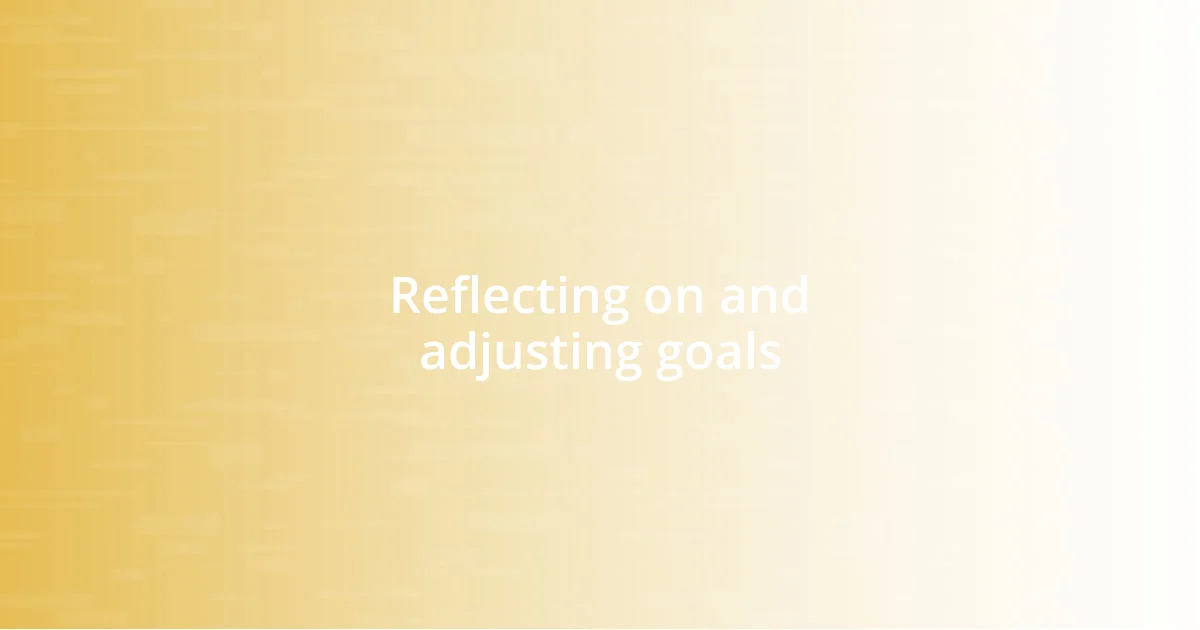
Reflecting on and adjusting goals
Reflecting on and adjusting our goals has become an essential part of my workflow. I distinctly recall a period last year when I realized our targets weren’t aligning with the realities of our project timelines. Instead of plowing ahead, I gathered the team for an open discussion, where we could all share our challenges. It was enlightening to witness how this collective reflection not only illuminated the gaps in our strategy but also deepened our understanding of each other’s perspectives.
One key moment stands out: after adjusting our goals based on feedback, we had a spontaneous brainstorming session that rejuvenated everyone’s motivation. We revisited our objectives with fresh eyes and redefined our success criteria. I had never imagined that simply taking the time to reflect could reignite our passion for the project. Have you ever found that when you adjust your goals, it feels like a breath of fresh air? I know I did, and it unified the team in ways I hadn’t expected.
Throughout this process, I learned the value of adaptability. It’s profound how being flexible with our objectives can lead to unexpected opportunities. When we shifted our focus to meet the changing demands of our clients, I felt a renewed sense of purpose not just for myself, but for my colleagues as well. Isn’t it fascinating how goal adjustment can turn challenges into stepping stones? This ongoing cycle of reflection and enactment has become a cornerstone of our success, and I believe it’s something every team should embrace.










